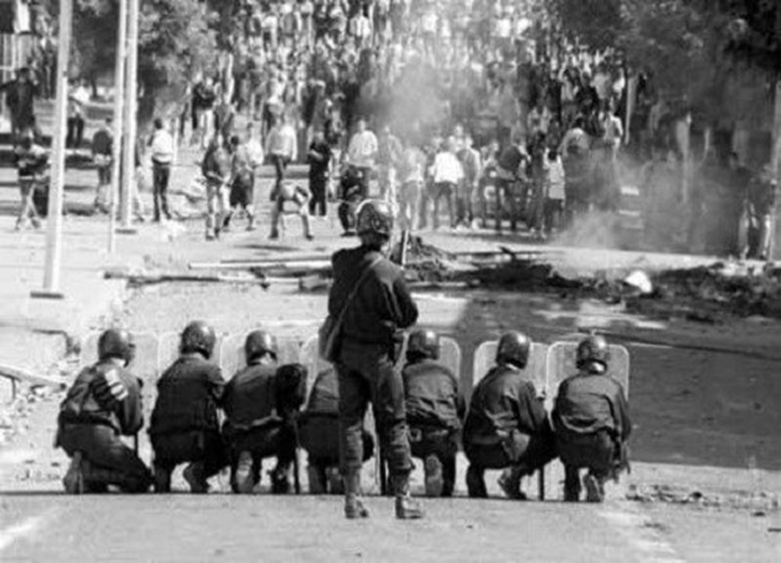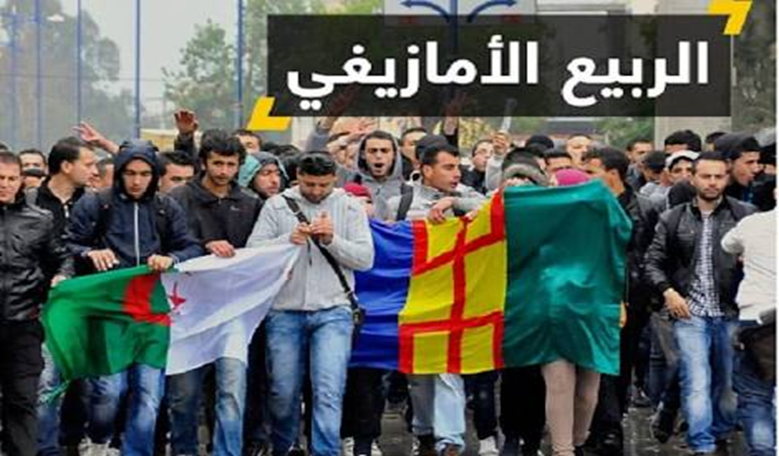April 80. The participating diaspora. Interview with Rabah Ait Messaoud

?1/ How did the first information about the Amazigh Spring arrive and how was it perceived
The connections between Kabylie and the diaspora, even if they have fluctuated depending on the period, have always existed. From the time of the Berber Academy, through the Groupes d'études berbères de Vincennes, the Imedyazen cooperative , to this day Algeria-France communications have been maintained. This meant that in April 1980 information came to us from the country through seasoned militants who kept us informed by telephone conversations; some who managed to get out brought back documents with them. On the very day of April 20, we knew on which sites the attack had been made and which were the first arrests.

Subsequently newspapers like Liberation, which were not yet engaged in the tendentious narratives of the 90s, also gave reliable news on what was happening in the corridors of Algerian power.
It was a strange moment. We were naturally worried for our comrades and friends but as soon as we learned that there had been no deaths, a feeling of pride and optimism took hold. Activists in Algeria defended Amazigh culture and language, but also democracy. We already sensed that something new had just started.
?2/ What were the first reactions of already organized activists? How did the Amicale des Algériens en Europe act

The militants already organized have created the committee for the defense of cultural rights in Algeria, the CDDCA, to alert international opinion to the fate of our friends and give maximum visibility to a fight that is not well known in France because it is led by a generation foreign to the media and political parties. French. This is how the organizers of this committee called for several demonstrations. In fact, there was already a first silent gathering organized on April 7 in front of the Algerian embassy, at the same time as that of Algiers. I remember that the embassy refused to receive the delegation and called it “non-Algerian”. The activists constantly alerted the press which, in general, passed on the information well. In addition, the CDDCA transmitted as much news as possible to the diaspora through leaflets distributed in cafes, metro entrances, markets, etc. Matoub Lounès dressed in military fatigues gave a solidarity gala at the Olympia on May 10, the room was full and a minute of silence was observed as a sign of support for the popular movement in Algeria. There were still rumors that reported deaths but they didn't really impact public opinion insofar as the level of organization made it possible to establish the truth fairly quickly.
The Association of Algerians in Europe reacted violently. As she often did when there were opposition activities, she sent her provocateurs to the April 26 demonstration. Without much success.
?3/ What were the reactions of French intellectuals and those of the French authorities
The support petition launched by the CDDCA on June 3 was signed by 140 academic and artistic personalities. There were among them individuals who had supported the Algerian people during the war of national liberation.

On the other hand, the demonstrations in front of the embassy were repressed by the French authorities. The FLN had solid relations with the French authorities. During the demonstration on April 26, hundreds of people were arrested and taken by van to Vincennes. Some activists, former members of the Fédération de France, who had already stayed there during the war, said then with humor that they had the impression of making “a pilgrimage”.
?4/ Was emigration quickly mobilized or did you notice attitudes of surprise or fear
Contacts with emigration generally went well. Favorable reactions and fear were mixed. The activists were well received, the emigrants were scandalized by what was happening, even if they did not necessarily come to the demonstrations. The AAE has spread the rumor several times that the passports would be withdrawn from the demonstrators and the emigrants feared that they would not be able to return to the country. An old practice.

5/ From your point of view, how is the message of April 80 evolving in the Algerian diaspora? Do you observe a convergence with the other North African or Sahelian communities? Is there in the diaspora an evolution on the Amazigh question among your Arabic-speaking compatriots?
Favorable development on the Arabic-speaking side. Today even the Islamists try to recover the Amazigh question whereas for them, the militants who carried it in 1980 were godless. A little later, a large part of the emigration will consider that what happened in Kabylie is the prelude, the engine of what happened later in Tunisia, in Egypt, in Libya during the so-called Arab springs . In Tunisia, when Idir sang, it was a huge success. In Morocco too. Many videos circulate where we see Tunisians singing Matoub. Over the years, I have had the opportunity to meet several Tunisians or Moroccans in hospital, taxi drivers or merchants of these two nationalities at the Aligre market. They showed me their admiration for the action of the Kabyles. The Kabyles enjoy great prestige with the Moroccan Berbers who consider them as the precursors of a fight which must liberate North Africa. But despite this popular expectation, there are still no frameworks where these impulses can gather.
In the Algerian diaspora associations exist. They each organize at their own level solidarity demonstrations for the most precarious, shows, lessons in the language, the Amazigh culture… But there again, there are no structures to bring them together, this is sorely lacking. Yennayer (Amazigh New Year's Day), which is celebrated throughout Europe and North America, is just beginning to be organized jointly by citizens from the three countries. Often, moreover, these events are commemorated at the initiative of binational local elected officials. It is true that States are careful not to allow actions of solidarity. Maybe this is the fight of the hour. In any case, thank you for adn-med for having opened this file. It is time to reflect on a fresh start on the subject of Tamazgha.
*Retired civil servant, militant of the Amazigh cause in the diaspora.
Source : websites

